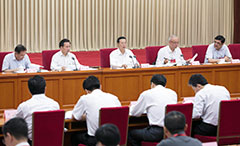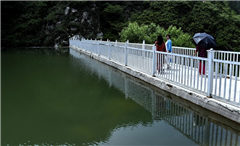Officials caught protecting polluters
2017-08-01
China Daily
Central environmental inspectors revealed severe pollution problems in Fujian, Liaoning and Hunan provinces, showing that some cities failed to regulate pollution and even protected the polluting companies, the nation’s top environmental authority said on July 31.
This round of high-level inspections, launched by the State Council in April, have reviewed how governments implemented the rules in fighting the country’s war on pollution in the three provinces. The performance of some cities was disappointing, leading to deterioration of the environment and large pollution risks, the inspectors said.
They found some city governments protected polluting companies by providing falsified documents in the central region of Hunan and northeastern region of Liaoning, statements from the Ministry of Environmental Protection showed.
In the core and buffer zones of Haitang Mountain National Natural Reserve, in Fuxin, a city in Liaoning, the management committee illegally approved a company’s dumping of mineral waste, causing severe contamination. The committee issued a false document to prove the mining and waste were not within the reserve, inspectors said on July 31.
Similar problems were found in Hunan. The Xiangtan city and Xiangxiang county governments issued false documents in December, saying that one of the leading companies discharged pollutants at a level lower than the national standards based on the online monitoring data. The documents were meant to allow the company to pass an environmental assessment.
In fact, monitoring facilities at the Xiangtan Soda Co did not work, and emissions were excessive for a long time, the ministry said.
Inspectors found some governments were neither willing nor able to regulate major polluters.
Some nonferrous metal mining and smelting plants, branches of China Minmetals Corp, a Beijing-based corporate group with assets worth 1.6 trillion yuan ($238 billion), should have been punished for dozens of pollution problems since 2013 in Hunan, the central inspectors found. Instead, local environment bureaus did not do that, and the companies refused to correct the problems, the inspectors said.
Inspectors found the leadership of the three provinces did not pay sufficient attention to environmental protection, poorly implementing their efforts, while many companies were found to have excessive and illegal emissions.
After the monthlong inspection, 2,653 officials had been held accountable for their performance as of June, the statements said.
Over 12,800 polluting companies were required to suspend production or shut down, a total of 185 million yuan in fines were collected and 237 people from the companies were detained by the end of June.
Ma Yong, an environmental law researcher at the Supreme People’s Court legal center, hailed the thorough inspection and severe punishment that followed, which has changed the behavior of some government officials and companies.
“We have to admit that some governments did have severe problems, but it was a good opportunity for central inspection to correct their behaviors,” Ma said.
He added the central government should establish other ways to implement high-level inspections to keep the pressure on irresponsible officials and companies for longer than just a month.
China has conducted four rounds of inspections since January 2015, and all 31 provincial regions will be covered by the end of 2017, officials said.


